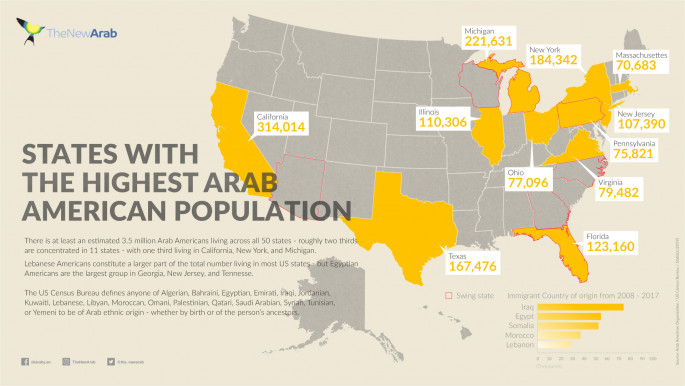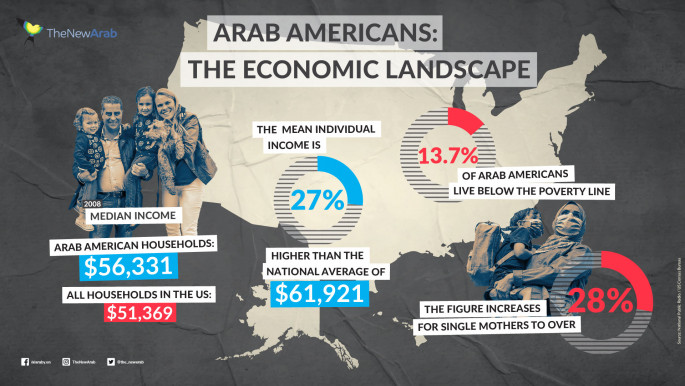
Voter suppression and intimidation are Arab American issues too
This problem of infringing on the constitutional right to vote - the foundation of a democratically representative government - is a persistent one that gets less attention in the media among certain communities. This includes among Arab Americans, who have been the targets of hostility at the polls and Islamophobia, especially since 9/11.
It is important to name the political agents and coalitions responsible, and discuss the range of tactics they use to suppress and intimidate voters, but also to raise awareness of the lasting impact these incidents and practices have on communities not commonly included in the political and social landscape of US civic life.
The history of this strategy stems back to Reconstruction and post-Reconstruction when the majority white (male) population was forced to accept the political inclusion, participation, and representation of freed male black slaves, and eventually women in 1920.
Voter intimidation tactics included gangs of white men and police harassing, attacking, and killing freed slaves as they endeavoured to register to vote and cast their ballot in elections. Voter suppression included limited access to voter registration, flagrant literacy tests, poll taxes, and whites-only primaries.
 |
Officials in Michigan have been suppressing and intimidating Arab American voters for years |  |
Though these purely and obviously racist suppression tactics have been eliminated by laws and court rulings, the strategy has not been abandoned by political coalitions that see non-white, largely economically disenfranchised Americans as problem voters who they have to eliminate from the political equation in order to stay in power.
Today we see mostly Republican political agents, media, and elected officials involved in manipulating voter ID laws, voter purging, voter caging, gerrymandering and felony disenfranchisement laws. They also take advantage of inconspicuous election laws that make certain mundane acts - such as community activists helping people to vote -illegal. By the narrative of these agents, these tactics are necessary to defend against "voter fraud", an issue that data analysis has shown to have no significant basis in any modern election.
Systemic problems with elections and voter systems means that often elected officials in charge of running elections are partisan, and therefore have an incentive to manipulate the system to achieve the outcome they desire for their party.
 |
|
| Click to enlarge |
In our political landscape today, the most populous racial and ethnic minority groups receive the most attention in these discussions, namely Black and Hispanic/Latinx communities. Yet, these attempts to suppress and intimidate voters by Republicans also affect Arab Americans.
For example, officials in Michigan have been suppressing and intimidating Arab American voters for years. In 2000, the city of Hamtramck lost in a US Justice Department lawsuit that alleged systematic suppression of Arab Americans, as they required Arab Americans to prove they were citizens in order to vote - a burden not required by white voters in the area.
More recently, the Bangladeshi and Arab American communities of Hamtramck and Dearborn Heights have grown, and community members trying to help voters cast their ballot have been criminally charged with voter fraud. When these communities raised concerns of voter suppression by officials who failed to respond to absentee ballot requests and issues, election officials and legal authorities instead targeted these groups, looking for ways they violated election laws. This has only served to intimidate good-willed voters, civil rights, and voting rights activists in the community.
Read more: Our Arab American forefathers left us a legacy we can't afford to ignore
This year, alleged attempts of voter suppression have been uncovered in Lackawanna, New York, a town with a large Yemeni American community. A city councilman, Geoffrey Szymanksi went out of his way, and took a few hours off of work to object to ballots cast by some 200 voters, all but one of which had Arab- or Muslim-sounding names.
This is especially unreasonable, given that a significant number of the names on Szymanksi's list of objections were not even registered absentee ballot voters, and so the question of how he came up with these names remains unresolved. It's also noteworthy that this came at a time of increased civic engagement by Yemeni Americans - half of the seats in the districts where Szymanski objected to voters' ballots were won by Arab American candidates.
 |
As Arab Americans continue to mobilise politically and engage in civic action, they too will come under heightened attack at the polls |  |
Such a strategy and tactics are not limited to Republicans; Szymanksi was former Democratic mayor of Lackawanna and is a current city councilman. Many blue states, including New York, have strict voting laws like closed primaries that continue to make voting difficult and help keep turnout low.
This way of running elections maintains the political status quo, and keeps establishment politicians of 10, 20, and 30 years in power. Though, New York election and voter laws have been opening up and improving accessibility since 2018, when the infamous Independent Democratic Caucus was dismantled by a wave of young, diverse, and progressive candidates that won out.
These newly elected state senators and assemblywomen and men passed an election reform package that established early voting, pre-registration for minors, and consolidated state and federal primaries to the same day.
 |
|
| Click to enlarge |
The Arab American community has made its presence felt, and its dissent against the Trump administration's harmful rhetoric and policies can be heard loud and clear. When Trump signed the Muslim ban in January 2017 - one of his first acts in office - a "bodega strike" was put together just one week after the ban was announced. Nearly 7,000 Yemeni Bodega owners in New York City closed their doors in protest.
Yemeni American communities in New York also played a vital role in flipping the only two remaining Republican seats in southern Brooklyn in 2018, helping elect Max Rose to the House of Representatives, and Andrew Gounardes to the State Senate.
As Arab Americans continue to mobilise politically and engage in civic action, they too will come under heightened attack at the polls and in our election systems as a group that lopsidedly supports Democratic candidates.
It is important to label the voter suppression and intimidation that has taken place against Arab and Muslim Americans as a part of the destructive Islamophobia and hate crimes that destroy lives and endanger communities.
We need to speak up and speak out about voter suppression and intimidation as it impacts various groups that do not always receive the attention they deserve in the public eye. We also need to double our efforts to single out, criticise, and vote out the officials that institute these harmful policies and practices.
We must fight for electoral voting reforms that will make voting more fair, accessible, and our systems more independent and transparent. These fights will not be easy, but they are just, and - like in 2018 - in 2020, our communities are fighting back.
Rabyaah Althaibani is a Yemeni-American community organiser. She is the founder of Arab Women's Voice, the first 100 percent women and minority owned political consulting firm based in New York City.
Follow her on Twitter: @rabyaahahmed





 Follow the Middle East's top stories in English at The New Arab on Google News
Follow the Middle East's top stories in English at The New Arab on Google News


